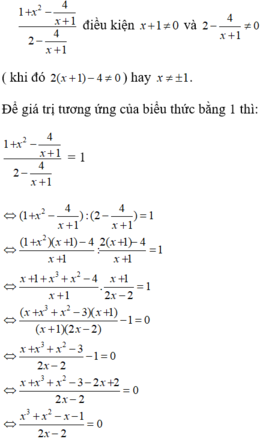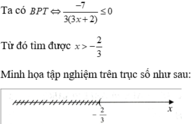Hãy nhập câu hỏi của bạn vào đây, nếu là tài khoản VIP, bạn sẽ được ưu tiên trả lời.

Chắc là \(M=\dfrac{4x+1}{x^2+3}\) đúng không nhỉ?
\(M=\dfrac{-\left(x^2+3\right)+x^2+4x+4}{x^2+3}=-1+\dfrac{\left(x+2\right)^2}{x^2+3}\ge-1\)
\(M=\dfrac{12x+3}{3\left(x^2+3\right)}=\dfrac{4\left(x^2+3\right)-4x^2+12x-9}{3\left(x^2+3\right)}=\dfrac{4}{3}-\dfrac{\left(2x-3\right)^2}{3\left(x^2+3\right)}\le\dfrac{4}{3}\)
\(\Rightarrow-1\le M\le\dfrac{4}{3}\)
Mà M nguyên \(\Rightarrow M=\left\{-1;0;1\right\}\)
- Với \(M=-1\Rightarrow\dfrac{4x+1}{x^2+3}=-1\Rightarrow\left(x+2\right)^2=0\Rightarrow x=-2\)
- Với \(M=0\Rightarrow\dfrac{4x+1}{x^2+3}=0\Rightarrow4x+1=0\Rightarrow x=-\dfrac{1}{4}\)
- Với \(M=1\Rightarrow\dfrac{4x+1}{x^2+3}=1\Leftrightarrow x^2-4x+2=0\Rightarrow x=2\pm\sqrt{2}\)
Vậy \(x=\left\{-2;-\dfrac{1}{4};2-\sqrt{2};2+\sqrt{2}\right\}\) thì M nguyên

Bài 1:
a) Ta có: \(P=1+\dfrac{3}{x^2+5x+6}:\left(\dfrac{8x^2}{4x^3-8x^2}-\dfrac{3x}{3x^2-12}-\dfrac{1}{x+2}\right)\)
\(=1+\dfrac{3}{\left(x+2\right)\left(x+3\right)}:\left(\dfrac{8x^2}{4x^2\left(x-2\right)}-\dfrac{3x}{3\left(x-2\right)\left(x+2\right)}-\dfrac{1}{x+2}\right)\)
\(=1+\dfrac{3}{\left(x+2\right)\left(x+3\right)}:\left(\dfrac{4}{x-2}-\dfrac{x}{\left(x-2\right)\left(x+2\right)}-\dfrac{1}{x+2}\right)\)
\(=1+\dfrac{3}{\left(x+2\right)\left(x+3\right)}:\dfrac{4\left(x+2\right)-x-\left(x-2\right)}{\left(x-2\right)\left(x+2\right)}\)
\(=1+\dfrac{3}{\left(x+2\right)\left(x+3\right)}\cdot\dfrac{\left(x-2\right)\left(x+2\right)}{4x+8-x-x+2}\)
\(=1+3\cdot\dfrac{\left(x-2\right)}{\left(x+3\right)\left(2x+10\right)}\)
\(=1+\dfrac{3\left(x-2\right)}{\left(x+3\right)\left(2x+10\right)}\)
\(=\dfrac{\left(x+3\right)\left(2x+10\right)+3\left(x-2\right)}{\left(x+3\right)\left(2x+10\right)}\)
\(=\dfrac{2x^2+10x+6x+30+3x-6}{\left(x+3\right)\left(2x+10\right)}\)
\(=\dfrac{2x^2+19x-6}{\left(x+3\right)\left(2x+10\right)}\)

c) Để A nhận giá trị nguyên khi và chỉ khi:
![]()

Kết hợp với điều kiện, tập hợp các giá trị của x nguyên để A nguyên là: {0; 2; -2; 4}.

Ta có :
\(x^2-4x+5=\left(x^2-2.2x+2^2\right)+1=\left(x-2\right)^2+1\ge1>0\)
Vậy đa thức \(x^2-4x+5\) vô nghiệm với mọi giá trị của x
Chúc bạn học tốt ~

a: ta có: \(A=x^2-3x+10\)
\(=x^2-2\cdot x\cdot\dfrac{3}{2}+\dfrac{9}{4}+\dfrac{31}{4}\)
\(=\left(x-\dfrac{3}{2}\right)^2+\dfrac{31}{4}>0\forall x\)
b: Ta có: \(B=x^2-5x+2021\)
\(=x^2-2\cdot x\cdot\dfrac{5}{2}+\dfrac{25}{4}+\dfrac{8015}{4}\)
\(=\left(x-\dfrac{5}{2}\right)^2+\dfrac{8015}{4}>0\forall x\)


Giá trị biểu thức bằng 0
Khi x 3 + x 2 - x - 1 ⇒ x 2 x + 1 - x + 1 = 0
⇒ x + 1 x 2 - 1 = 0
⇒ x + 1 = 0 hoặc x – 1 = 0
x + 1 = 0 ⇒ x = −1
x - 1 = 0 ⇒ x = 1
x = 1 và x = -1 không thỏa mãn điều kiện
Vậy không có giá trị nào của x để giá trị tương ứng của biểu thức bằng 1

a: \(P=\dfrac{x^2-x-18+2x+6-4x+12}{\left(x-3\right)\left(x+3\right)}\)
\(=\dfrac{x^2-3x}{\left(x-3\right)\left(x+3\right)}=\dfrac{x}{x+3}\)
b: P=2/3
=>x/(x+3)=2/3
=>3x=2x+6
=>x=6(nhận)
c: P nguyên
=>x chia hết cho x+3
=>x+3-3 chia hết cho x+3
=>x+3 thuộc {1;-1;2;-2}
=>x thuộc {-2;-4;-1;-5}

a: Khi x=5 thì A=5/(5+3)=5/8
b: \(C=A+B=\dfrac{x}{x+3}+\dfrac{2}{x-3}+\dfrac{3-5x}{x^2-9}\)
\(=\dfrac{x^2-3x+2x+6+3-5x}{\left(x-3\right)\left(x+3\right)}=\dfrac{x^2-6x+9}{\left(x-3\right)\left(x+3\right)}=\dfrac{x-3}{x+3}\)
c: Để C nguyên thì x+3-6 chia hết cho x+3
=>\(x+3\in\left\{1;-1;2;-2;3;-3;6;-6\right\}\)
=>\(x\in\left\{-2;-4;-1;-5;0;-6;-9\right\}\)
